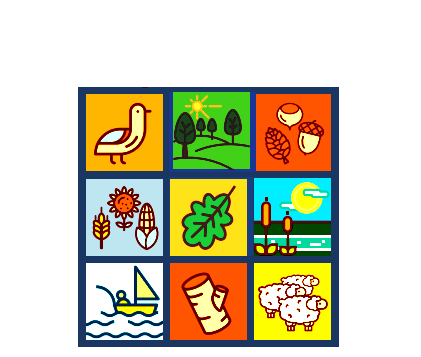Nature-based Solutions in the Mediterranean: A report showcasing 14 innovative actions by IUCN members and partners
Throughout the Mediterranean region, environmental organizations are rolling out different types of Nature-based Solutions to tackle key societal challenges in a variety of ecosystems. In a Mediterranean context of increased temperatures, sea level rise, more frequent extreme weather events, rapid population growth and mass-tourism, Nature-based Solutions are contributing to build more resilient societies by conserving nature and maintaining healthy ecosystems. For policy-makers, these solutions offer the advantage of providing a tangible and quantifiable return on investment, which makes them more relevant from an economic perspective.

Photo: IUCN-Med
Read the full report here: https://www.iucn.org/sites/dev/files/content/documents/towards_nature-based_solutions_in_the_mediterranean.pdf
Since 2016, when several resolutions on Nature-based Solutions were approved by IUCN during the Hawaii World Conservation Congress, this innovative concept has grown to become a global environmental trend, in an effort to mitigate the impacts of climate change, reduce disaster risk, promote water and food security and ensure energy supply. Besides contributing to human well-being, Nature-based Solutions support many sustainable development goals (SDG) as defined by the United Nations. Likewise, the European Union has created an EU Research and Innovation policy agenda on Nature-based Solutions and Re-Naturing Cities.
Although the conceptual definition of Nature-based Solutions still needs some refinement, this approach can be already observed in many projects carried out around the Mediterranean basin. The following report is our official recognition to those actions that preserve natural ecosystems and contribute to a sustainable Mediterranean.
Following a general call, over a one-year period IUCN-Med received 23 examples proposed by IUCN Members and partners in the Mediterranean as a part of a collective effort. As a result, fourteen actions were selected as the best examples of how NbS are being applied in different types of ecosystems and different countries in the region.
The final list of actions supporting Nature-based Solutions in the Mediterranean includes:
Forests:
- Seyhan Basin, Turkey “Adaptation of Forest Ecosystems and Forestry to Climate Change ”, led by Nature Conservation Centre (DKM) with support from General Directorate of Forestry.
- Konya, Turkey “Adapting Mediterranean Forests to Climate Change ” led by WWF Turkey, in cooperation with General Directorate of Forestry and Nature Conservation Centre (DKM).
- Ifrane, Morocco. “Holm oak clearing operations carried out by local associations” , led by Ifrane National Park and AFD / FFEM in cooperation with the Provincial Waters and Forestry Service of Ifrane (HCEFLCD).
Rangelands:
-Asin, Jordan. “Securing rights and restoring lands for improved livelihoods”, led by IUCN-Regional Office for West Asia, with the support of Ministry of Agriculture, Ministry of Environment, and the Arab Women Organization.
- Matrouh Governorate, Egypt. “Collecting and preserving scarce Natural Range seed plants and restoring natural pastures in large areas to improve Bedouin community livelihoods”, initiated by Al Ramis Society for Local Community Development of Barrani and GEF Small Grants Programme in cooperation with Desert Research Center, the Egyptian Ministry of Agriculture, the Sustainable Development Centre for Matrouh, the Center of Agriculture and the Faculty of Agriculture.
Rainfed Crops
Andalusia, Spain “Conservation and management in special protection areas for steppe-land birds in Andalusia”, a project of the Regional Ministry for the Environment and Territorial Planning Junta de Andalucía supported by ASAJA, COAG, UPA, SEO/BirdLife, Group of Municipalities, AGAPA and AMAYA.
Marine and Coastal
Andalusia, Spain “LIFE Blue Natura – Andalusian blue carbon for climate change mitigation: quantification and valorization mechanisms for marine and coastal habitats”, a project from the Andalusian Ministry of Agriculture, Fishery and Sustainable Development”, supported by Agencia de Medio Ambiente y Agua de Andalucía, CSIC, IUCN Centre for Mediterranean Cooperation and Asociación Hombre y Territorio.
Sea, Estuaries, Seagrass Beds and Cliffs
Moroccan Mediterranean “Sustainable management of Morocco’s marine resources”, led by Association of Integrated Resource Management (AGIR) in cooperation with FEM / SGP, MAVA Foundation and the Critical Ecosystem Partnership Fund.
Sand Dunes
Boumerdes, Algeria. “Corso Commune coastal dune ecosystem rehabilitation”, under the leadership of Association Ecologique de Boumerdes, supported by Algerian Ministry of Foreign Affairs (MAE), UNDP, Wilaya de Boumerdes, Corso Commune and decentralised government departments.
Deltas
Catalonia, Spain. “Adaptation and mitigation measures to climate change in the Ebro Delta”, a project by IRTA (Institute of Agrifood Research and Technology) in partnership with ACA (Agència Catalana de l'Aigua), CAT (Consorci d’Aigües de Tarragona) CRSAE (Comunitat de Regants - Sindicat Agrícola de l'Ebre), ICGC Institut Cartogràfic i Geològic de Catalunya), OCCC (Oficina Catalana del Canvi Climàtic) and Universidad de Córdoba.
Agriculture
Camargue, France. “Agro-ecological project of Petit Saint-Jean”, an initiatve of Tour du Valat supported by Fondation de France and Agroof.
Coastal lagoons
Camargue, France. “Adaptation of the Camargue’s former saltworks to climate change”, lead by Conservatoire du littoral, Parc naturel régional de Camargue, Tour du Valat, Société Nationale de Protection de la Nature in cooperation with SYMADREM.
Riparian forests
Murcia, Spain. “Ecological restoration of the Segura and Moratalla Rivers, control of non-tree invasive alien species and restoration of Priority Habitats of Community interest”, coordinated by Confederación Hidrográfica del Segura, with the participation of OISMA (Oficina de Impulso Socioeconómico del Medio Ambiente), the Autonomous Community of the Murcia Region and
ANSE (Asociación de Naturalistas del Sureste)
Freshwater ponds and wetlands
Albufeira, Portugal. “Biological swimming pool”, an initiative from CLUB MED da Balaia, supported by Bio Piscinas Lda. and Club Mediterrannée
